What you need to know about clothing embroidery
2024-12-19Nine Essential Embroidery Tools
2025-01-03EMBROIDERY TIPS
What you should know about choosing embroidery thread
POSTED ON DECEMBER 27th,2024 BY BAi
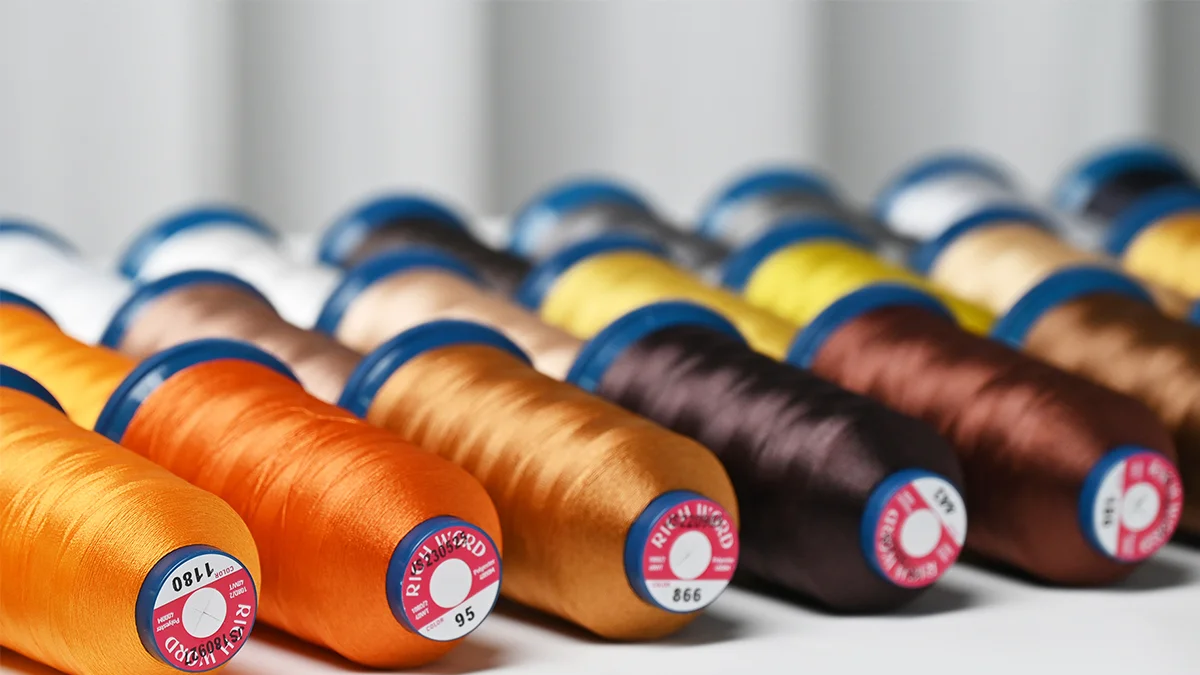
Do you want to complete a perfect piece of embroidery? If so, then you must pay attention to the embroidery thread.
Embroidery thread is the foundation of embroidery and it will directly affect the effect of embroidery. Many customers often ask for advice on embroidery threads because they find it is not easy to pick out the right embroidery threads from the various kinds of threads available in the market. I believe that many embroiderers suffer from this problem, especially beginners.
To this end, this article will be centered around embroidery thread and detail how to buy embroidery thread.
The following aspects will be mentioned:
#1 Choose the right material of embroidery thread
#2 Choose the right weight of embroidery thread
#3 Choose the right specification of embroidery thread
#4 Choose the right color of embroidery thread
#5 Consider the quality of embroidery thread
#6 Consider the matching of bobbin thread and top thread
#7 Learn about the brands of embroidery thread
#8 Learn about the purchase channels of embroidery thread
#9 Consider the price of embroidery thread
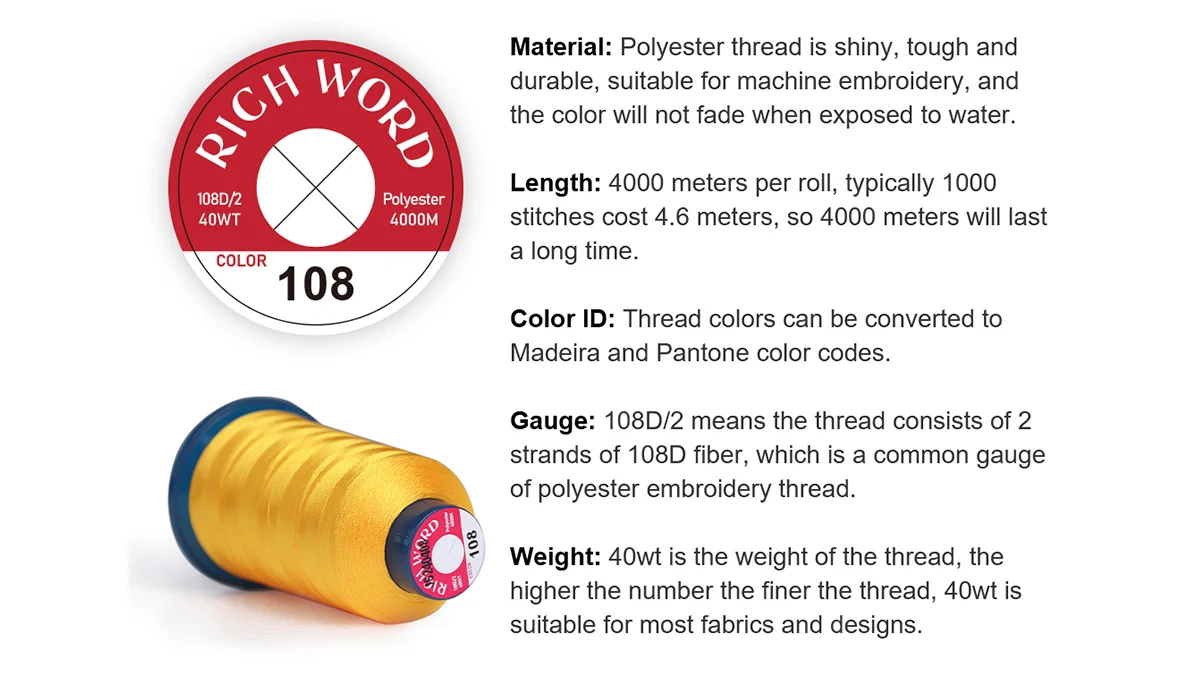
#1 Choose the right material of embroidery thread
When it comes to picking embroidery thread, material is probably the first thing that comes to mind for many people. Different materials of embroidery threads have their own characteristics and are suitable for different fabrics, so you need to make your choice according to your embroidery project.
The three most common threads used by embroiderers are cotton, rayon, and polyester, while wool, silk, and metallic threads are also often used for embroidery. Understanding the characteristics of different materials and the applicable embroidery projects can help you quickly choose the right embroidery thread, so take a look.
-1 Cotton thread
Currently, cotton thread is the most popular among beginners because it is available in over 400 colors and is easy to work with. At the same time, cotton thread is also popular with old-fashioned embroiderers because its colors are usually matte, and the finished product embroidered with it is weak in gloss and comes with a vintage nostalgic feel.
Indeed, cotton thread is a great material for embroidery and is suitable for most embroidery projects. Cotton thread is usually soft, durable, and fits well on the surface of the fabric.
The finished product made of cotton thread is soft and comfortable to wear, as well as being moisture-absorbent and breathable, easy to iron and less likely to attract dust, making it ideal for children's clothing and sportswear. It's worth noting that cotton thread has some drawbacks: it's often not as strong, lacks elasticity, and wrinkles easily.
All in all, if you need a matte, vintage embroidery effect or if the fabric you are embroidering needs to fulfill the requirements of being soft, comfortable, sweat-absorbent and breathable, such as children's clothing and sportswear, then it is recommended that you choose cotton thread.
-2 Polyester thread
Polyester threads are threads spun from polyester fibers that are highly abrasion-resistant and durable, not easy to wear and break, so they are ideal for items that need to meet durability, such as outdoor products and sports equipment.
Meanwhile, polyester thread can withstand chemicals and is easier to clean when stained with grease, so those clothes that are easily stained with grease are perfect for embroidery using polyester thread, such as the work clothes of people in the catering industry.
In addition, polyester embroidery thread will not fade even after many washes, so it is also widely used for fabrics like towels that need to be washed frequently.
By the way, do you know why embroidery beginners prefer polyester thread? That's because polyester threads are generally tougher so that can withstand greater tensile strength, support the high intensity of the embroidery machine and effectively reducing the frequency of thread breakage.
As a synthetic fiber, polyester thread has many advantages, but it also has some disadvantages: polyester thread itself is not breathable, so it is not suitable to use it on summer clothes. In addition, polyester thread is prone to static electricity, which tends to attract dust and impurities.
So, if you want your embroidery work to be durable, easy to clean, and not easy to fade, then polyester thread is definitely a good choice. In addition, if you are an embroidery beginner and want to complete the embroidery more easily and smoothly, then you may wish to try polyester thread.
-3 Rayon thread
Rayon is an artificially synthesized silk thread through chemical methods, invented to replace natural silk, so it has some of the characteristics of natural silk: soft, lustrous, and can be dyed to obtain a rich selection of colors.
However, rayon fades easily when exposed to sunlight or frequently washed, and should not be washed frequently, so it is more suitable for application as a decorative fabric, and is generally not used for bedding. In addition, rayon thread, like polyester, usually has good strength and elongation properties and does not break easily.
All in all, if your embroidery work is meant to be used as decoration rather than actual use, then you can opt for rayon thread.
-4 Wool thread
Wool thread is most often used in knitted garments. Wool thread itself has a velvety soft texture, which makes the work embroidered with wool thread more delicate and softer. At the same time, wool thread has good coverage, which can cover the base fabric well and make the embroidery effect more three-dimensional. In addition, due to the warmth of wool thread, it can add some warmth to the embroidery, which is very suitable for the application of winter clothes.
However, wool thread is generally thicker and less suitable for embroidery work that requires detail. Moreover, embroidery using wool thread is more prone to pilling because of the roughness of the fibers.
So, if you need to add warmth to your embroidery or want to embroider something more three-dimensional on a knit garment, then wool thread would be a good choice.
-5 Silk thread
Silk thread is unique embroidery thread with delicate texture and distinctive luster that makes embroidery work a sense of nobility and sophistication. At the same time, the soft and smooth fibers of silk thread make it suitable for highly detailed embroidery, which can express the three-dimensionality and details of the work.
Silk thread is therefore ideal for embroidery projects that require a luxurious effect. However, the soft fibers of silk thread are prone to knotting during the embroidery process, making it more demanding on embroidery skills and unsuitable for novice embroiderers.
In short, if you want a delicate and noble embroidery effect, then choose silk thread, but firstly, you must have some embroidery experience and skills.
-6 Metallic Thread
Metallic thread is not uncommonly used in embroidery, mainly because of its ability to add unique texture and sheen to embroidered piece, making it more ornate and eye-catching. Metallic thread is often used to embroider ornate garments and accessories, such as wedding dresses and gowns. Metallic thread is also widely used to embroider upholstery such as tapestries and pillows, adding a luxurious and artistic touch to the home space.
However, because metallic threads are usually thin and hard, they are prone to breaking during the embroidery process, making them unsuitable for complex embroidery work. In addition, the use of metallic threads requires embroidery skill and experience, so it is difficult for beginners to master.
So, if you want your embroidery work to be very ornate, striking and artistic, then metallic threads will not disappoint you.
-7 Other Threads
In addition to the common embroidery threads mentioned above, there are also some other threads made of special materials that are used in embroidery, such as color changing thread, glow in the dark thread, reflective embroidery thread, etc.
Usually these threads made of special materials are used to meet some specific needs, generally will not be used, here will not be too much elaboration, if you need to know more about the relevant content, feel free contact us.
#2 Choose the right weight of embroidery thread
Thread weight is another headache for beginners. Although we always see the numbers on the spool or on the box of embroidery thread, the truth is that many people don't understand what these numbers mean.
The most common unit of weight for embroidery thread is wt, which is based on the length of a gram of thread; if a gram of thread is 30 meters long, then it is 30 wt of thread. So it's not hard to understand that the bigger number, the thread thinner.
As a matter of fact, the weight of the thread is easy to choose, the most commonly used are 40wt and 60wt. If there are no special requirements, these two weights of embroidery thread will be enough for your daily embroidery use. Generally, embroiderers prefer 40wt thread, but if there are elaborate details or small fonts in the embroidery design, then 60wt will be more suitable.
The weight of the embroidery thread needs to be chosen according to your embroidery project, it's really simple,the fabric heavier, the thread needs to be thicker. So, if you need to embroider heavier fabric, then use heavier embroidery thread, and if you need to embroider lighter fabric, then use lighter embroidery thread.
#3 Choose the right specification of embroidery thread
The specification of embroidery thread is indicated by the thickness of the thread and the number of strands. Taking 120D/2 as an example, 120D indicates the thickness of the thread and 2 indicates the number of strands. Here the D which indicates the thickness refers to the gram weight of 9,000 meters of thread, so 120D thread means 9,000 meters of thread weighing 120 grams.
The larger the number in front of D, the thicker the embroidery thread, and conversely, the smaller the number in front of D, the thinner the embroidery thread.
The general specifications of embroidery thread are: 150D/2, 120D/2, 108D/2, 75D/2 and so on. The most commonly used sizes are: 120D/2 rayon thread, 108D/2 polyester thread, 150D/2 specialty thread.
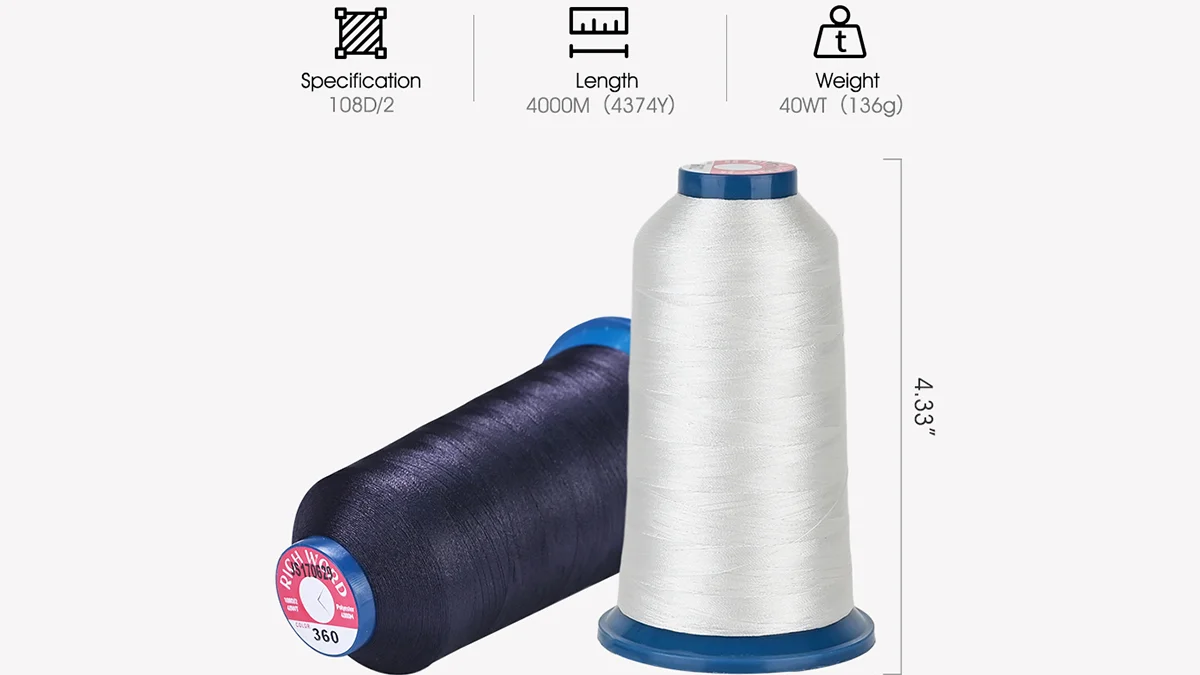
Here's a tip: Different specifications of thread need to be used with the right needle.
#4 Choose the right colors of embroidery thread
Color is a very important factor in the success or failure of an embroidery work, and if use the wrong colors, then it is likely to ruin a good design. There are so many colors of embroidery threads that it is not easy to pick them, and what is even more difficult is to pick those colors that look very similar to each other. So, you'd better pick your colors scientifically and don't trust your vision and feelings too much.
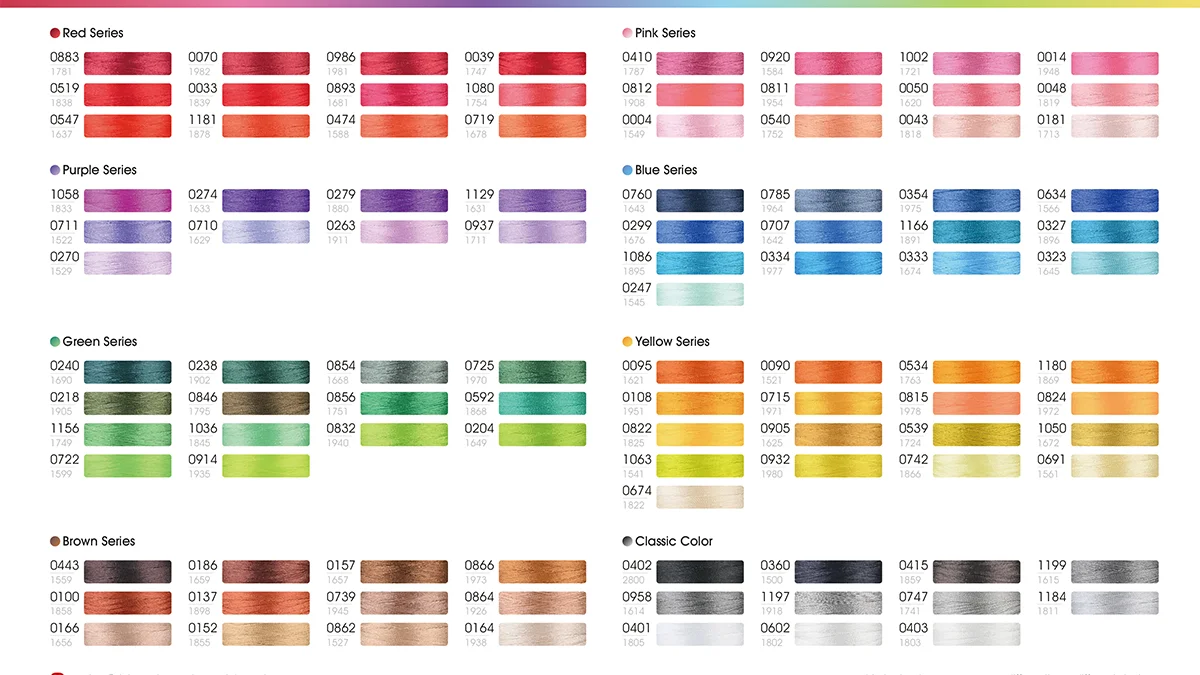
The vast majority of embroidery thread manufacturers have a color chart there that lists the various colors available. If not, you can go to the store and purchase a color chart, which will help you find the color you want more accurately and quickly.
By the way, never forget to consider the base color of the fabric you are embroidering. If you choose to embroider in a color that does not match the base color of the fabric, then you may end up with a very disappointing embroidery result.
#5 Consider the quality of embroidery thread
The quality of the embroidery thread is very important, if you use poor quality embroidery thread then it can easily lead to some embroidery faults such as birds nesting and broken threads. These faults will not only make the embroidery process very painful but may also directly lead to the failure of the embroidery. So when you are selecting embroidery thread, make sure you check the quality, here are some tips:
-Observe the appearance
Thread without quality problems should look neat, shiny, and should be free of burrs and breaks. In addition, the thread should be full and even in color, and there should be no noticeable color difference.
-Test the tensile strength
Good quality embroidery thread should have some elasticity and won't break easily, so you can try to pull the thread.
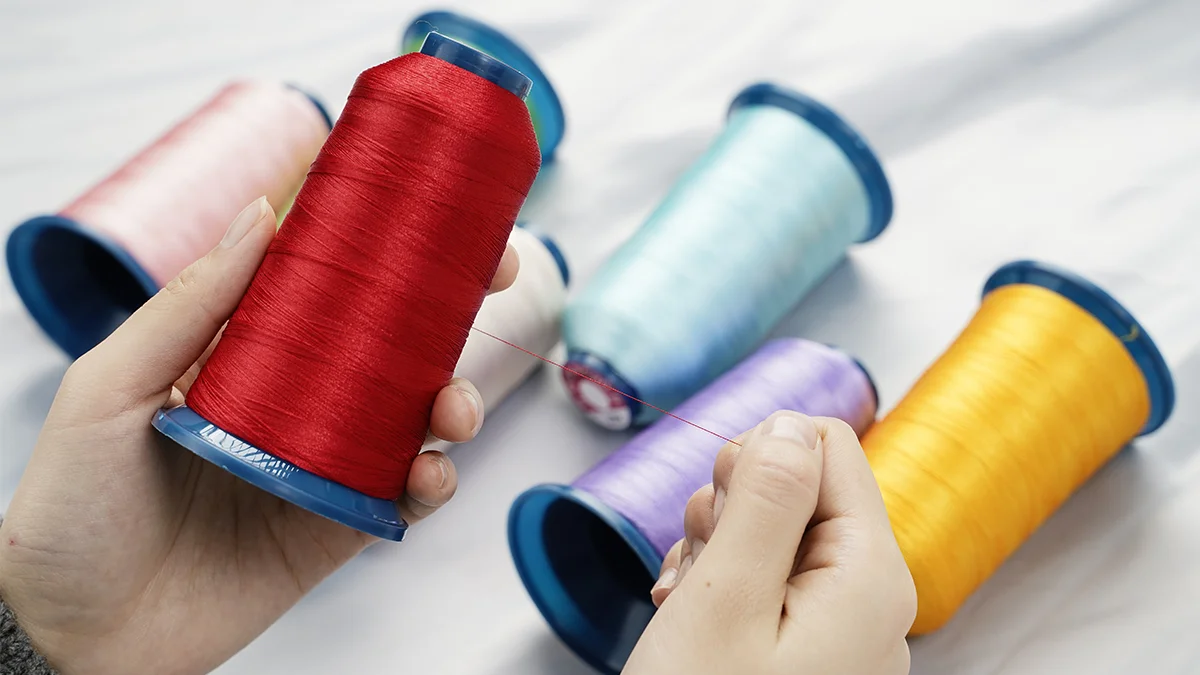
-Test the feel
Generally smooth and delicate to the touch of the thread quality is better, in the selection of embroidery thread you can be roughly judged by the feel of the thread quality.
#6 Consider the matching of bobbin thread and top thread
One thing you need to be aware of is that embroidery threads are categorized into top thread and bobbin thread depending on their use. When embroidering, two strands of thread, the top thread and the bobbin thread, are embroidered on the fabric at the same time, with the top thread exposed and the bobbin thread on the back.
Normally, the bobbin thread will not be visible, but if the tension of the top thread is too high or the tension of the bobbin thread is too low, then the bobbin thread will appear on the front side of the embroidery. Therefore, it is recommended that you use a bobbin thread of the same color as the top thread, so that even if there is a situation where the bobbin thread is pulled out, it will not look obvious, effectively reducing the possibility of embroidery failure.
Also, when using a computerized embroidery machine, the bobbin thread is usually thinner than the top thread, this is to make the embroidered back thinner and lighter and to make the computerized embroidery machine run better. For example, a 40wt top thread is paired with a 60wt bobbin thread, and a 60wt top thread is paired with a thinner 90wt bobbin thread.
#7 Learn about the brands of embroidery thread
Usually, choosing embroidery thread from a well-known brand ensures higher quality and consistency. Here, I am recommending a few embroidery thread brands for you, and trust me, they are all good choices.
-1 DMC
When it comes to DMC as an embroidery thread brand, I believe many embroiderers are not unfamiliar with it as it is really well known.DMC was founded by a French company in 1746 and is one of the most well-known brands of embroidery thread in the world.DMC's embroidery threads are widely acclaimed and loved by embroiderers for their rich color choices, high quality, and wide range of applicability. Among the many types of DMC embroidery threads, the most commonly used and recommended is its cotton thread series.
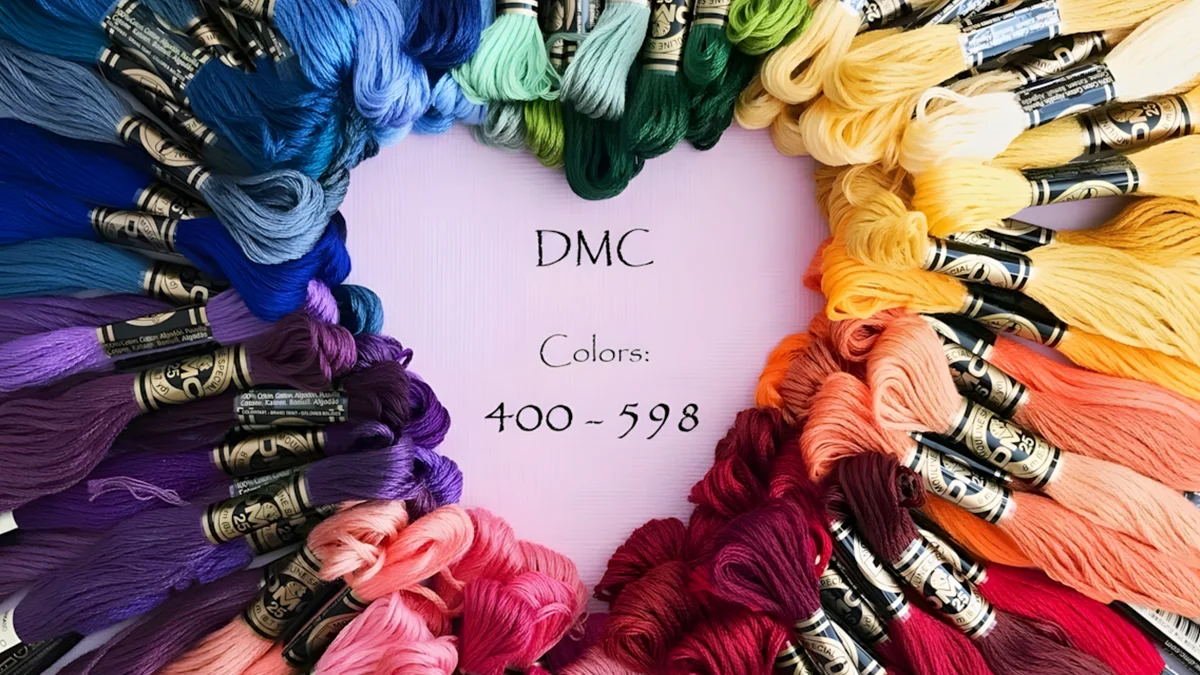
-2 Madeira
Madeira is a brand from Germany, known for its high quality, like DMC, it is also an internationally renowned embroidery thread brand. Madeira embroidery thread has excellent gloss, bright colors, and resistance to fading. The most famous of Madeira embroidery thread are rayon and polyester threads, which are the preferred embroidery thread for many embroidery lovers and professional embroiders.
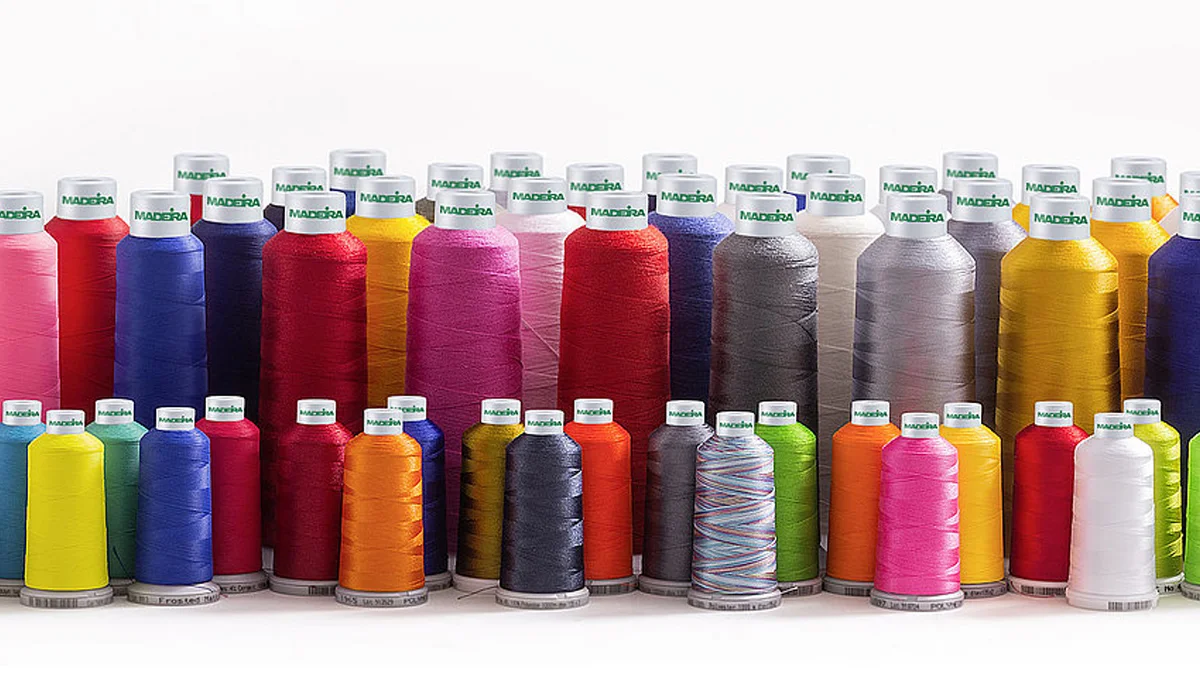
-3 Other Threads
Expect the two international brands recommended above, I would also like to recommend our own brand - POOLIN. Who are familiar with BAi know that we are a supplier dedicated to providing high quality products and ultimate service, not only can we provide high quality computerized embroidery machines, but also professional embroidery accessories and consumables.
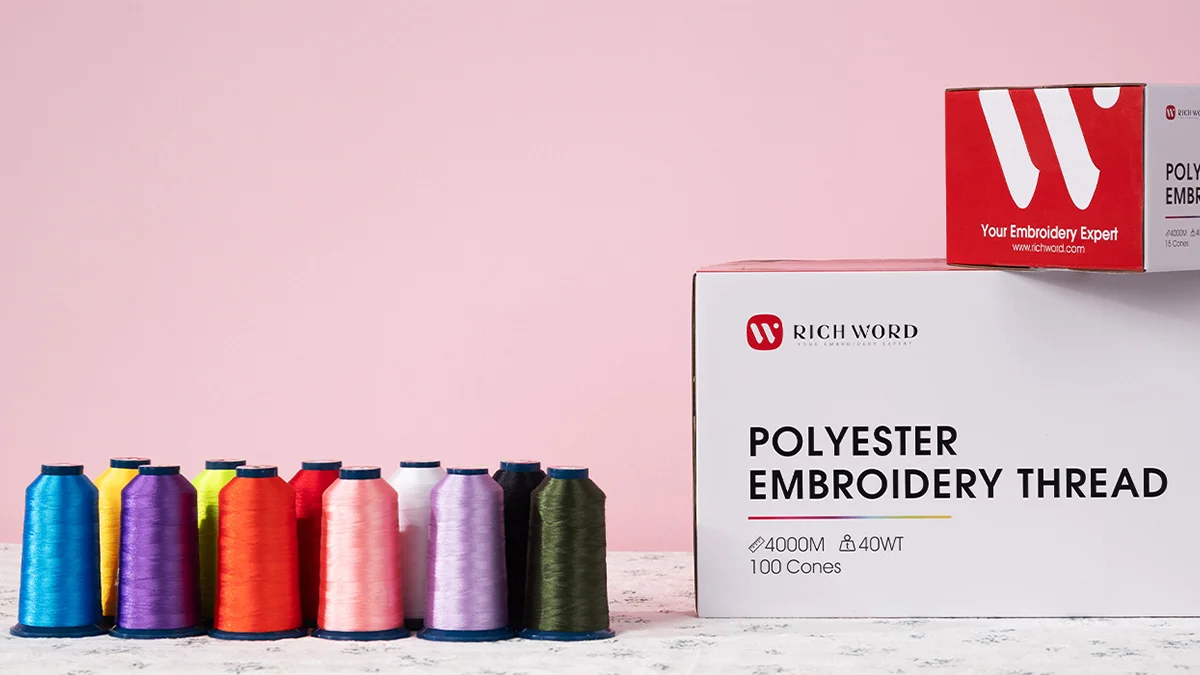
Although POOLIN's popularity is far less than the above two brands, you can not doubt its quality at all, because we are absolutely professional in computerized embroidery machine and its accessories and consumables.
POOLIN offers a wide selection of embroidery thread colors and materials that can meet your different embroidery needs. If you are looking for cost-effective and want to get higher quality embroidery thread at a lower price, then you may want to try POOLIN's thread.
#8 Learn about the purchase channels of embroidery thread
If you have mastered the above knowledge of picking embroidery thread, then the next thing you should consider is how to buy it. In fact, there are many avenues for buying embroidery thread and here are some common ones:
-Embroidery supply stores
If you want to buy embroidery thread quickly, then an offline store should be the best way to choose. Embroidery supply stores are usually easy to find, you can check out a nearby craft market or neighborhood, and they usually offer a variety of brands and types of embroidery thread.
The advantage of this purchase channel is that in the store, you can see the actual objects and even touch them, which will help you pick the right embroidery thread. In addition, if the store owner is a person with a lot of experience in embroidery, then you can also ask him for some advice and help.
-Online shopping platform
If you are not so eager to get the embroidery thread, then apart from offline embroidery supply stores, online shopping platform are also a good channel to buy. Currently, there are many online shopping platforms with merchants selling embroidery threads, such as Alibaba, Amazon, and eBay, etc. You can search for keywords to find the embroidery threads you want and buy them.
The advantages of this purchase channel are:
Firstly, on online platforms, you can easily search for various brands, types and colors of embroidery threads with a wider range of choices while not having to go through the trouble of visiting various stores.
Secondly, buying embroidery thread on online platforms is cheaper because the prices of the products on these platforms are open to the public and there is more competition among the merchants, who tend to give some discounts in order to attract customers to come and buy.
Finally, user reviews are available on online shopping platforms, which can help you have a more comprehensive understanding of a certain embroidery thread.
#9 Consider the price of embroidery thread
The price of embroidery thread can be affected by a variety of factors such as brand, material, and specification. Generally speaking, the following types of embroidery thread will be more expensive:
-Premium brand embroidery thread
Generally speaking, the price of embroidery thread from premium brands is not cheap, the premise is that it is genuine. After all, the vast majority of premium brand products will be more rigorous than the average brand products in terms of quality, craftsmanship, material selection, etc., so very often, the premium brand is also a kind of quality assurance. But there is one thing you need to pay attention to, not all premium brand products are value for money, which requires you to carefully judge.
-Threads made of special materials
Some embroidery threads will be more expensive because they are made of rare or unique materials, such as gold and silver threads, natural silk threads and so on. It is also because of their special material, so it will come with a kind of noble and gorgeous embroidery effect.
- Special crafted threads
In addition, some embroidery threads with special processes will be more expensive, such as color changing threads and glow in the dark threads. The production process of these embroidery threads will be more complicated than ordinary threads, so it will also be more time-consuming and labor-intensive, then the more expensive price is reasonable.
Here's what you need to be aware of: while overly cheap embroidery thread is often problematic, but expensive embroidery thread doesn't mean good quality, so don't blindly judge embroidery thread based on price.
In short, remember to always consider your embroidery project when pick the embroidery thread, and choose and buy embroidery thread based on the embroidery effect you want.
Well, that's all there is to this article, and we hope that after reading it you will be able to choose and buy embroidery thread more easily and complete your embroidery project successfully! If you have any other questions, feel free to contact us, we're always here.
-1.png)
